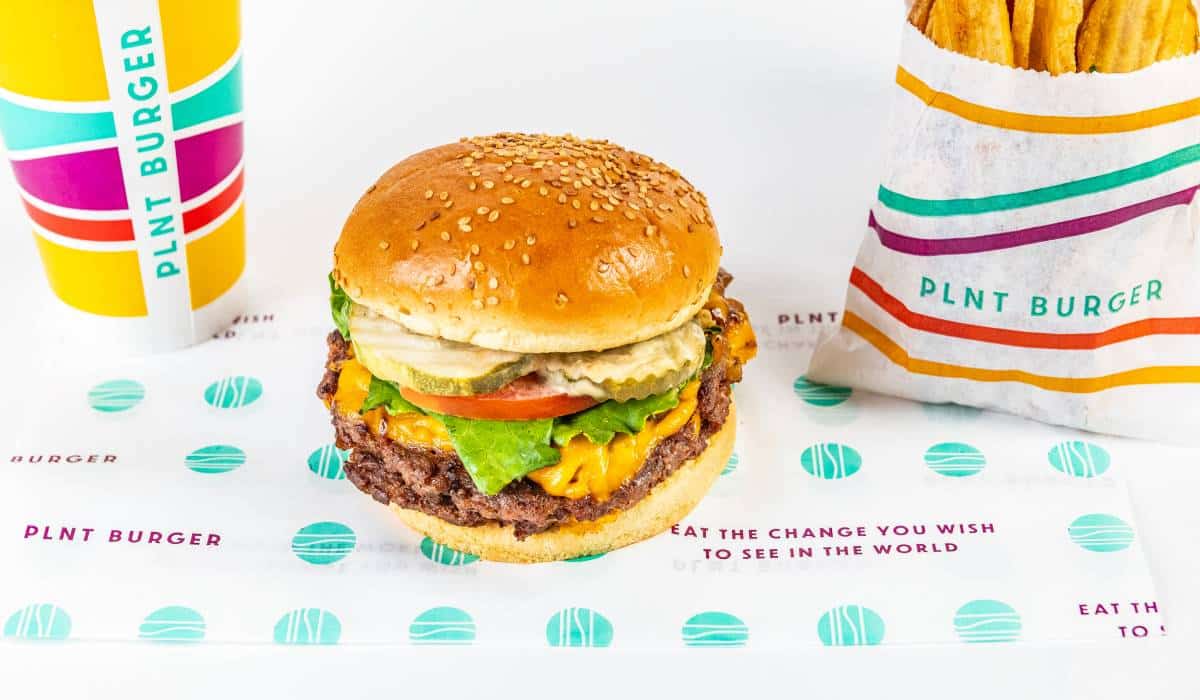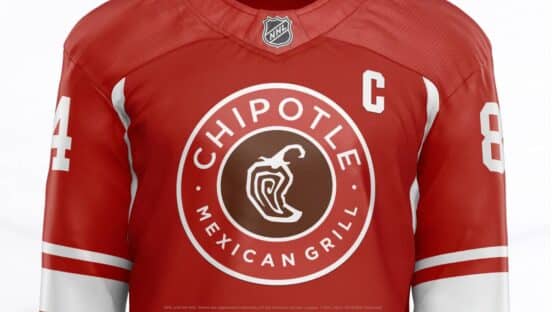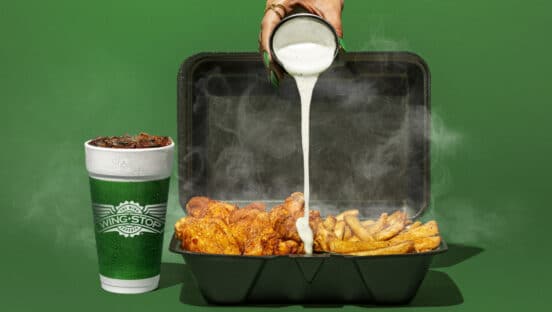The rise of plant-based menus can be described as nothing short of “incredibly quick,” says Seth Goldman, cofounder of fast casual PLNT Burger and chair of Beyond Meat.
From what he recalls three years ago, the segment nearly didn’t exist. It was on the cusp of being something people were aware of. Since, trial has been massive, especially from some of the biggest brands in fast food—Burger King (Impossible Whopper), McDonald’s (McPlant), KFC (plant-based nuggets), and more. The demand is clearly present, Goldman says, which is why PLNT Burger has grown from one to 12 restaurants after starting in 2019.
Spike Mendelsohn, cofounder and chef, shares his partner’s sentiment, saying culinary leaders have spent years transforming vegetables into center-of-the-plate products. The movement was backed by a number of celebrities; Beyond Meat’s roster of ambassadors includes Kim Kardashian, Kevin Hart, and Snoop Dogg. And the impact is worldwide. Mendelsohn remembers traveling to Greece this past summer and being amazed at how many restaurants had at least one vegan option.
“The interest and willingness is there,” Mendelsohn says. “I think we’re experiencing a shift in our system from what we grow and how it travels and what we eat, and people are becoming a lot more educated about it. From that stance, I see it as very popular and moving quite quickly.”
“… One of the things that we’re also doing with our brand is really democratizing plant-based foods because that’s where the importance is for the diets, wherever people need to eat less meat and salt and suffer from obesity or things like that,” he continues.
Founders: Spike Mendelsohn, Seth Goldman
Headquarters: Bethesda, Maryland
Year Started: 2019
Total Units: 12
Franchised Units: 0
Global retail sales of plant-based foods are predicted to reach as high as $162 billion by 2030, an increase from $29.4 billion in 2020, according to the Bloomberg Group. At that level, the segment would take up 7.7 percent of the global food market.
PLNT Burger aims to be a part of that significant runway. The concept owes its beginnings to a conference panel discussion in 2017 where Goldman and Mendelsohn were speakers. Goldman placed a cooler of Beyond Meat under Mendelsohn’s chair, which he took home and cooked for his vegan wife.
“I saw how excited that burger made my wife, and to me, I was like, ‘This is just good as anything that’s out there,’” Mendelsohn says. “my wife was the one that was like, ‘No, this is legendary.’ So I followed up with an email to Seth the next day.”
PLNT Burger’s menu is simple, with the PLNT Cheeseburger, PLNT Burger, Mushroom BBQ Bacon Burger, DBL PLNT Burger, Baja Burger, Crispy CHIK’N Sandwich, and Spicy CHIK’N Sandwich. Mendelsohn says there are plenty of opportunities for innovation within the space, as well. PLNT Burger previously had a chicken sandwich made from parts of a mushroom that were originally labeled as food waste. The restaurant sourced it from Pennsylvania-based farmers who said the mushroom “cooks and tastes like chicken.” The fast casual is also working on a McRib type of plant-based burger.
“I think innovation is a key pillar of what we do at PLNT Burger,” Mendelsohn says. “So something that excites us and pushes the limits and have fun with it. But also at the root, we like to keep our menu pretty small. So consistent. There is innovation. But we just don’t approve anything on the menu.”
PLNT Burger, founded in Maryland, has grown in the Northeast and Eastern Seaboard. As of August, there were locations in Boston, New York, Pennsylvania, Virginia, and Washington, D.C., in addition to Maryland. The chain moves into densely populated markets comprised of consumers who prefer healthier diets and are climate conscious. But it’s not just in urban areas. In fact, the restaurant in Columbia, Maryland, is more suburban and always seems to be a top performer.
The intention is to take PLNT Burger national, but before that, the brand will continue to grow concentrically in its geographic region. The chain hopes to have 16 locations by the end of this year and 30 by the completion of 2023. All restaurants are company-owned and will be in the foreseeable future. Real estate shouldn’t be a major issue since PLNT Burger began in a 110-square-foot space that challenged the brand to streamline operations and offer an efficient menu, says Goldman.
“As we scale, we’re able to get to small locations and put out a lot of product. And of course that yields a better return, per square footage, which of course is good,” he says.
That initial location was inside a Whole Foods, and PLNT Burger has kept that growth formula. Of the company’s 12 units in mid-August, 10 are based in the grocery store. The two brick-and-mortar restaurants are in New York City. Goldman and Mendelsohn view the Whole Foods strategy as a way to quickly enter an area and build awareness. A good example of this is PLNT Burger’s grocery location in Boston’s South End neighborhood. The store performed so well that the company is opening a streetside shop and another Whole Foods unit in the Greater Boston area.
“What’s pretty interesting about the Whole Foods model is that it allows us to open up in these different demographics and really study where the demand is,” Mendelsohn says. “… [We] use all that market leverage and assume that this market is somewhere where we should be playing. The two [store designs] really benefit from each other and help each other out.”
As it stands now, Mendelsohn acknowledges the plant-based market is not yet at critical mass. To his point, a recent report from global consulting firm Kearney revealed 27 percent of customers will consider a food’s environmental impact when shopping at grocery stores, but only 15 percent do so at restaurants.
But attention is growing, not waning, Goldman says. In August, the federal government passed the Inflation Reduction Act of 2022, which outlines billions of dollars in spending for clean energy and climate change. Also, a number of restaurant chains, large and small, have become increasingly transparent about their sustainability practices and have set benchmarks to reduce greenhouse gas emissions.
“It just feels like every month in the summer, it’s either floods or drought in the winter, it can be other weather events. And so, I think that is growing, as well,” Goldman says. “And I wish I could say that five years from now, climate change won’t be an issue. But you know, by the time we see ourselves expanding nationally, I’m confident climate concern will be as big as it is now. I know it’s going to continue to spread. So I’m not worried about climate concern and consciousness and people linking that into their diet. I don’t see that decreasing.”











